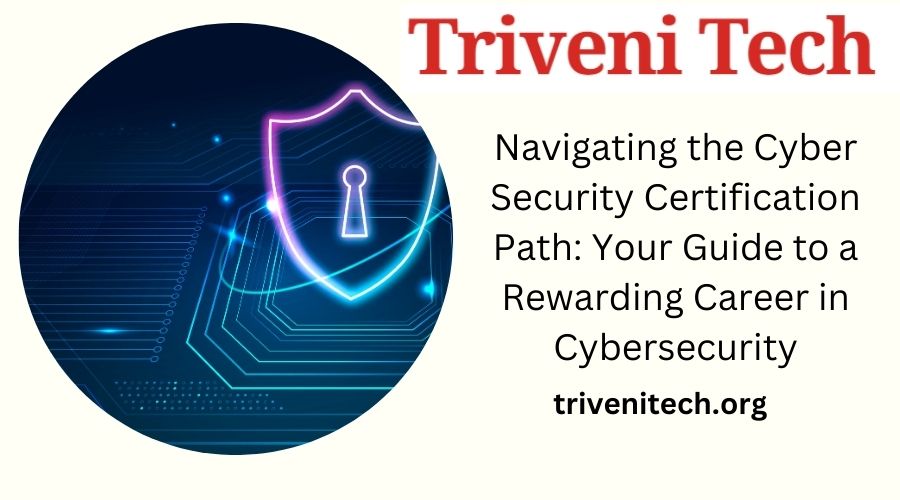Cybersecurity has become a crucial aspect of every organization’s operations in the current digital era. The need for skilled cybersecurity specialists has never been higher because of an increase in both the severity and frequency of cyberattacks. Navigating the certification route is crucial if you’re thinking about a career in cybersecurity since it will help you get the information and abilities required to be successful in this fast-paced industry. We’ll go over the prerequisites for each major certification, how they may help you progress in your cybersecurity career, and how to get them in this in-depth guide to the cyber security certification route.
Understanding Cyber security Certification path
A cybersecurity certification is a formal acknowledgment of an individual’s expertise in a range of security-related areas. A certification from a recognized organization confirms that the holder has the expertise and skills required to carry out a specific cybersecurity work. Certifications in cybersecurity are highly regarded by businesses and can significantly enhance job chances in the industry in addition to attesting to one’s ability.

Benefits of Cybersecurity Certification
A variety of benefits are accessible to potential cybersecurity employees that receive cybersecurity certifications:
Validation of Skill: A cybersecurity certification relates to your expertise in topics such as risk management, ethical hacking, network security, and incident response. Getting documents lets peers and employers alike see how skilled you are.
Career Advancement: Getting a cyber security certification path could give rise to growth in the profession and fresh job options. When hiring for cybersecurity occupations, employers often prefer people who have the required certifications. Certifications may also result in higher salaries and more responsibilities.
Industry Recognition: In the sector, cybersecurity qualifications are trustworthy and popular. Obtaining qualifications from reputable organizations shows your commitment to continuous learning and advancement in your career while also boosting your reputation as a cybersecurity specialist.
Specialization: The ability to focus on certain areas of interest, such penetration testing, digital forensics, or cloud security, is offered by several cybersecurity certificates. In order to establish themselves apart from other experts in the sector and gain knowledge in particular fields, you should pursue certifications in your chosen specialization.
Key Cybersecurity Certifications
Numerous cybersecurity documents are available, with each one emphasising an independent set of skills and areas of expertise. Let’s review some of the most important documents in the field of cyber security certifications:
CompTIA Security+: The CompTIA Security+ exam is a renowned foundational certification for professionals in the field of entry-level cybersecurity. It covers basic cybersecurity concepts such as identifying threats, risk management, cryptography, and network security.
Certified Information Systems Security Professional (CISSP)
The CISSP certification, provided by (ISC)2 , is intended for seasoned cybersecurity experts and covers a broad variety of topics including as asset security, communication and network security, security operations, and security and risk management.
Certified Ethical Hacker (CEH):The EC-Council offers the CEH certification, which focuses on ethical hacking methods and resources for assessing and improving an organization’s security posture. Professionals with CEH certification are taught to think like hackers and spot weaknesses before bad actors take advantage of them.
Certified Information Security Manager (CISM): Information security managers are the target audience for ISACA’s CISM certification, which stresses governance, risk management, incident response, and program creation and management.
Certified Cloud Security Professional (CCSP): The CCSP certification, provided by (ISC)², is intended for professionals in cybersecurity with a focus on cloud security. The certification covers topics like cloud architecture, data security, compliance, and cloud computing-related laws.
Cisco Certified Cyber Ops Associate: The EC-Council offers the CEH certification, which focuses on ethical hacking methods and resources for assessing and improving an organization’s security posture. Professionals with CEH certification are taught to think like hackers and spot weaknesses before bad actors take advantage of them.
Choosing the Right Certification Path: It’s important to take your experience level, hobbies, and professional ambitions into account while choosing cybersecurity awards. While seasoned practitioners may seek advanced documents like CISSP or CISM to further specialize and develop their careers, entry-level workers may find benefit in basic certifications like CompTIA Security+.
Studying each certification’s requirements, fees, and recertification requirements is also important to make sure they fit your professional development and career goals. For many credentials, taking a standardized test and fulfilling recertification or continuing education courses are necessary to keep the certification current.
Preparing for Certification Exams
A solid study tactics, determination, and devotion are necessary while preparing for cybersecurity certification tests. Take into consideration the following tips to boost your chances of success:
Study Resources: Take use of a range of study tools, such as study guides, practice tests, online courses, and textbooks, to ensure that you have covered every exam goal.
Hands-On Experience: To deepen theoretical understanding and hone practical skills, engage in hands-on laboratories, real-world projects, and simulations.
Study Schedule: Make a study plan that outlines whatever has to be studied every day or every week until the examination. Allow sufficient time for study and mock tests so you can determine your level of preparation.
Practice Exams: To evaluate your knowledge and identify your areas of weakness, take practice examinations on a regular basis. Concentrate on your weak points and go over your study materials again to be sure you understand them.
Join Study Groups:Connect with other certification candidates, share study strategies, and get advice from seasoned professionals by joining online forums, study groups, or regional conferences.
Stay Updated: By reading industry news, going to conferences, and becoming involved in professional organizations, you may stay up to date on the most recent advancements, trends, and best practices in cybersecurity.
Conclusion
Aspiring cybersecurity professionals may get the information, abilities, and credentials needed to thrive in this dynamic field by following the cyber security certification the way. Obtaining cybersecurity documents allows individuals to verify their knowledge, improve their chances of landing a job, and support the continuous battle against online dangers.
Whether you









+ There are no comments
Add yours